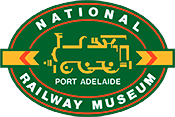Department of Planning, Transport and Infrastructure
Broad Gauge
Class operators: State Transport Authority/TransAdelaide/Department of Planning, Transport and Infrastructure
Model: 2100 Class
Built by: Comeng
Number in class: 18
Number series: 2101 to 2118
Height: 4.27m
Length (over coupling points): 25.5m
Width: 3.18m
Total Weight: 42 tonnes (39 to 41 long tons; 44 to 46 short tons) empty
Entered service: 17th November 1980
Maximum Speed: 140 km/h (87 mph) (conservative) but limited to 90 km/h (56 mph) in service
Provenance: DPTI
Seating capacity: Passenger seating capacity: 98 (90 in 2112)
Withdrawn: August 2015
Condemned: August 2015
Entered the museum: 10th July 2016
Condition: Excellent
Ownership: Port Dock Station Railway Trust
The 2000 – 2100 class are diesel hydraulic railcars and trailers that were built for the then State Transport Authority (STA) by Comeng, for use on the Adelaide metropolitan rail network. The 2000- 2100 class railcars were the first modern suburban railcars in South Australia and the second in Australia to feature air conditioning, semi-automatic side doors and a PA address system. They were also the last diesel hydraulic railcars built for a railway operating in South Australia.
The stainless steel body shell of the 2000 – 2100 class railcars was based on the American Budd SPV-2000, Metroliner and Amfleet car designs. The body shells were built by Comeng, in Granville New South Wales, and were railed to the Adelaide plant at Dry Creek for fitting out internally, except for cars 2001 and 2101 which were completed in New South Wales. The first two trailer cars 2101 and 2102 entered service on the 22nd of February 1980, with the last trailer car 2118 entering service on the 18th of August 1981.
The class was dubbed ‘Supertrains’ by the media and the general public but most railway staff and railway enthusiasts were quick to give them their more iconic nickname ‘Jumbos’. The 2000 – 2100 class railcars earnt this nickname due to their unique raised driving cab, which was very similar in principle to a Boeing 747 Jumbo aircraft.
The 18 2100 class trailer cars have to be operated with a power car, as they are not fitted with diesel motors or any source of electrical power. They were usually operated in two-car set (power car-trailer car) or three-car set (trailer car-power car-trailer car) configurations.
In the mid to late 2000s three 2100 class trailer cars (2103, 2112 and 2116) were refurbished internally and mechanically. From 2010 onwards a large percentage of the 2100 class trailer cars received the new Adelaide Metro Livery.
In February 2014 the 2000 and 2100 class railcars were no longer permitted to operate on the Belair and Seaford lines due to clearances as a result of the electrification of the Seaford line. The 2000-2100 class railcars were retired in August 2015 and were sent to scrap in June 2016, with two power cars and two trailers being preserved.
